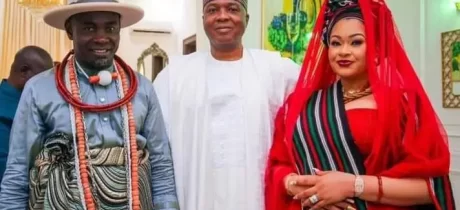
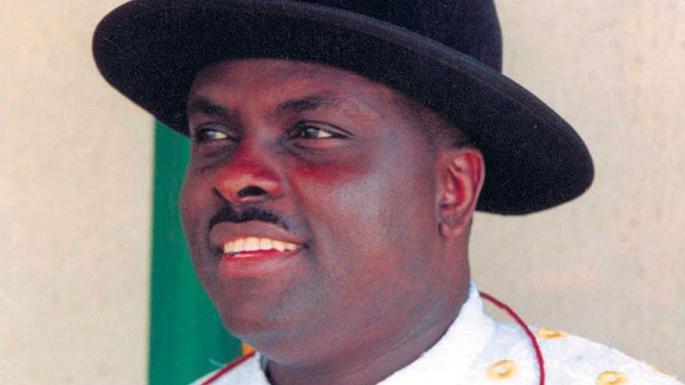
63 HEARTY CHEERS TO A COLOSSUS, TRUE PATRIOT, POLITICAL GO-GETTER AND PHILANTHROPIST PAR EXCELLENCE
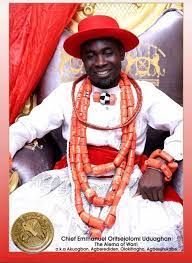
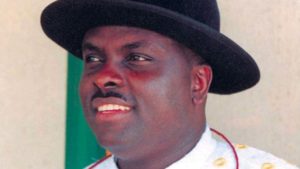 63 HEARTY CHEERS TO A COLOSSUS, TRUE PATRIOT, POLITICAL GO-GETTER AND PHILANTHROPIST PAR EXCELLENCE
63 HEARTY CHEERS TO A COLOSSUS, TRUE PATRIOT, POLITICAL GO-GETTER AND PHILANTHROPIST PAR EXCELLENCE
His Excellency, Chief James Onanefe Ibori
Former Executive Governor
Delta State
Your Excellency, I wish to congratulate you most warmly on the occasion of your 63rd birthday.
This is a refreshing opportunity to celebrate your enormous contributions and achievements.
You faithfully and diligently served the good people of Delta State, cast aside all forms of tribalism and delivered the dividends of democracy to them.
You extensively touched the lives of many Nigerians, shaped the future of the people, encouraged broad participation in governance, lifted Delta State to unprecedented relevance and helped to clinch victory at the polls for the People’s Democratic Party (PDP).
You implemented the bottom-top philosophy, institutionalized due process and sustained peace in Delta State by preaching the gospel of peaceful co-existence, good neighbourliness and unity amongst all
You carried traditional rulers along in sustaining peace, through periodic meetings
You created an enabling environment for the private sector to thrive
You brought development and transformation to the geo-political entity called Delta State through Operation 2000 Projects
You excelled in development issues and relationship with your deputy
You paid bursary allowances to students of tertiary institutions, curbed unemployment, youth restiveness and ethnic crisis in Delta State.
You promoted peace, harmony and development in the Niger Delta.
You campaigned for the diversification of the nation’s economy, power shift, resource control and derivation as well as enthronement of equity and justice in a restructured Nigerian polity where true federalism reigns.
You also campaigned for decentralization of policing and security responsibilities of government.
You built bridges of friendship and understanding among Nigerians
You demonstrated that leadership is not a function of tribe but a matter of vision, determination and mission
You recorded successes in security, job creation, human resources capacity building, gender and youth empowerment, environmental sustainability and remediation, fiscal discipline and budgetary reforms.
You did exceedingly well in transportation, healthcare delivery, water supply, basic and higher education, rural electrification, sports, ICT, agriculture and housing.
You provided better roads, built bridges, facilitated the training of Deltans in local and foreign universities and provided selfless service to mankind
As a responsible governor of Delta State, the relationship between the Executive and the Legislature was a model in terms of peaceful co-existence, separation of powers and checks and balances. The judiciary also enjoyed tremendous support and co-operation from the Executive.
Indeed, you exceeded the expectations of the founding fathers of Delta State through visionary, exemplary and transformational leadership.
I wish you good health, long life and God’s continued protection.
Congratulations and many, many happy returns
CHIEF EMMANUEL ORITSEJOLOMI UDUAGHAN
ALEMA OF WARRI AND CHIEF EXECUTIVE OFFICER (CEO),
WEBSTER GROUP OF COMPANIES
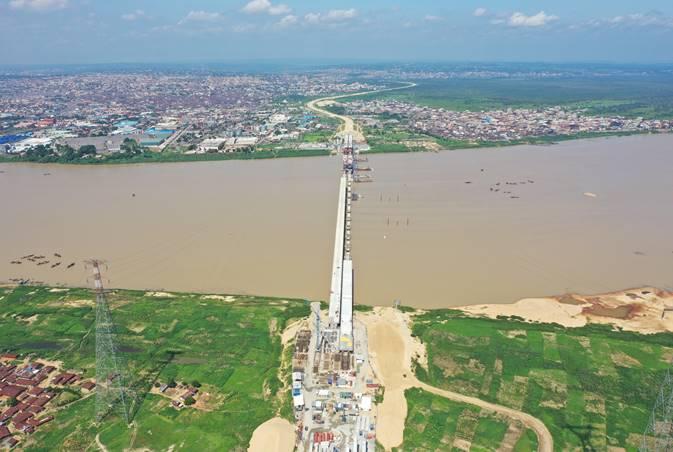
ENHANCING SOCIAL INTEGRATION AND REGIONAL CONNECTIVITY – SPOTLIGHT ON THE SECOND RIVER NIGER BRIDGE
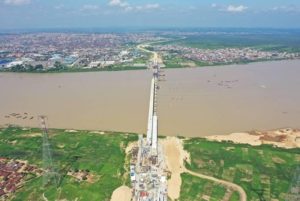
One of the most profound sayings in the southeast region of Nigeria, is an adage that says, “The world is a marketplace”. When put in clearer context, this adage carries two meanings, the first, which seems to be the most obvious is that the Igbo ethnic nationality, fondly called Ndigbo, spread across the southeast and parts of the South-South, are majorly traders and business-minded people. The second, which carries a deeper connotation, is that the marketplace is the core of social, community and business interaction.
Prominent in this region is the city of Onitsha, a town located on the eastern bank of the Niger River. Onitsha is the economic hub of commerce and industry in the South-East geopolitical zone of Nigeria. It hosts the largest market in Africa in terms of geographical size and volume of goods and is strategically positioned as a regional hub for trade, business, and logistics in the region. Regardless of the several business ventures and investments that people from the South-East have scattered around the country, every end of year, during the festive season, almost everyone from the region comes back home to meet with their kinsmen, celebrate their achievements and engage in cultural activities.
Homecoming is everything. It offers the most valuable opportunity for integration. This integration alongside an impressive ingenuity for business and trade across the region has fostered an inspiring degree of social mobility that continues to drive economic growth and development in the region and across the country. In the middle of this all, stands, the Niger bridge, a symbol of hope, commerce, culture, and progress.
After over 50 years of connecting people both within and to the region, regular traffic, imposing heavy static loads on the bridge is taking a toll on the first Niger Bridge, giving rise to the urgent need for a second bridge crossing – The Second River Niger Bridge. For many stakeholders in the region, the completion of the Second River Niger Bridge will be a dream come true, as many have spent an important part of their lives looking forward to the impact and immense benefits that the bridge will bring to their personal lives, social engagements, and businesses.
A project of the Federal Government, through the Ministry of Works and Housing, in collaboration with the Nigerian Sovereign Investment Authority, the Second River Niger Bridge is expected to, among other things, minimize traffic congestion affecting the current bridge and ensure a safe and sufficient river crossing.
The Second River Niger Bridge is not just another regional amenity; it is a key national infrastructure that will play a major role in enhancing everyday life and social integration for dwellers while also driving trade and economic activities. As a significant bridge in the region and the nation, the Second River Niger Bridge will contribute immensely to the expansion of a well-developed road transportation network, providing ease for commuters and enhancing regional connectivity. It will make homecoming even sweeter.
Handling the construction of this bridge is Julius Berger, the company known for its quality and reliability, which has delivered some of Nigeria’s most important buildings and infrastructure and demanding engineering feats, such as the Lekki-Ikoyi Bridge in Lagos.
For the average resident in the South-East and environs, the drive for progress is an everyday activity. From making large supplies and sales on a regular basis, to expanding chain stores, or even successfully climbing the ladder of the apprenticeship system, to become a proud business owner. These amongst other stories of advancement, are the kind of progress, the Second River Niger Bridge will enable once completed. With the Second River Niger Bridge, inter-state travel within the region becomes more convenient. Social and economic integration also becomes more enhanced. It would also foster trade activities and other commercial engagements, like transporting raw materials and finished goods to factories, warehouses, suppliers, distributors, stores, and the end-consumers.
As shown on the project microsite where progress on the bridge is made transparent to the public, so far, reports around the ongoing construction, show good progress on the Second River Niger Bridge Project since commencement. For example, the superstructure is in progress, the geotechnical design and In-construction service are recording good and steady developments; the culverts have been completed, while work is in progress on both the Owerri Interchange and the Toll Station.
The project has started to deliver value for the community and this progress we can hope to continue till the full completion of the Second River Niger Bridge project.
– By Nnamdi Ogbo, Asaba
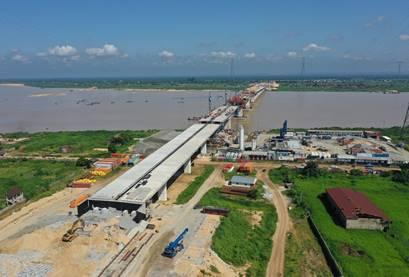
HOW THE SECOND RIVER NIGER BRIDGE WILL IMPACT THE ECONOMIC DEVELOPMENT OF NIGERIA FROM THE SOUTH- EAST
 HOW THE SECOND RIVER NIGER BRIDGE WILL IMPACT THE ECONOMIC DEVELOPMENT OF NIGERIA FROM THE SOUTH- EAST
HOW THE SECOND RIVER NIGER BRIDGE WILL IMPACT THE ECONOMIC DEVELOPMENT OF NIGERIA FROM THE SOUTH- EAST
Every day, millions of people journey from Asaba to Onitsha and back through the iconic Niger Bridge, which has become a symbol of national enterprise. Atop the Asaba side of the bridge reads the sign, “Welcome to the land of progress.” The mere sight of it sparks the image of the entrepreneurial Nigerian building a future for themselves and their family.
On the other side of the bridge is Onitsha, Anambra State, home to the biggest commercial market in West Africa. Merchants in Onitsha Market deal in every type of product you can imagine — mobile phones, foodstuff, clothing items, toiletries, bathroom fittings, etc. Every year, an estimated $5 billion worth of goods pass through that market. Onitsha is also home to 51 Iweka Road, one of the largest distribution networks for Nigeria’s multi-billion-dollar movie industry, Nollywood.
Thirty minutes (or 22 km) away from Onitsha is a small town called Nnewi. According to Forbes, it “has bred more naira billionaires than any other town in Nigeria, and possibly Africa”. Nnewi is also famously a hub for automobile spare parts dealers, manufacturers of household goods, and many of the largest transport companies in Nigeria. Several of these business activities happen across states and require hours commuting from the East to the West of Nigeria. However, the snag is that most of this economic activity flows through one bridge.
The current Niger Bridge is a 1402.08-metre steel truss bridge that connects Onitsha to the rest of Nigeria. It is over 56 years old, dating back to 1965. The bridge is part of the Trans-African Highway between Lagos and Mombasa, Kenya, and is also the primary connection between Eastern and Western Nigeria, two highly industrious regions. So, one cannot overstate its importance to Nigeria and Africa’s prosperity.
Over the years, the need for a second Niger Bridge has arisen. Since the construction of the first Niger Bridge, Nigeria’s population has grown by over 400%, and the amount of people travelling through Asaba and Onitsha has also skyrocketed. This creates a heavy flow of traffic for the travellers and residents of both cities.
Speaking to the New York Times earlier this year, Patrick Okigbo, a policy analyst, said about the current state of traffic on the Niger Bridge, “…it impacts the cost of doing business. It impacts lives. If they can afford it, nobody travels by road anymore. If you can’t, then you go on a prayer.” In answer to the needs and yearnings of the people, the construction of a new bridge will ease the traffic burden enhancing the free flow of access to work, business centers, markets and other places that have social and economic significance to the people.
The Second River Niger Bridge is the product of a Public-Private Partnership involving the Federal Ministry of Works, the Ministry of Finance, the Nigeria Sovereign Investment Authority (NSIA), the Presidential Infrastructural Development Fund (PIDF), and Julius Berger Nigeria Plc. The project is a Design, Finance, Build, Operate and Transfer (DFBOT) model. This means that the government owns and finances the project’s construction while Julius Berger, a company with a track record of excellence over 50 years, designs and builds.
Back in 1970, Julius Berger was called upon to repair the dilapidating Onitsha bridge, which was accomplished in just seven weeks. The company has also delivered an impressive number of iconic projects that have supported Nigeria’s economy over time.
The scope of Julius Berger’s work for the Second River Niger Bridge includes constructing two secondary bridges at Amakom Village Road and Atani Road, as well as approach roads from Asaba and Onitsha, a new cloverleaf interchange at Onitsha-Owerri Road, and a toll station.
Currently, work on the bridge includes the incremental launching of the superstructures for both the western and eastern approach roads. For the access roads, earthworks and road pavements are underway, as well as the installation of culverts and stormwater drainage. In addition, the current flyover at the Owerri interchange is being demolished and replaced with a new flyover bridge with culverts and a standard drainage system.
The Second River Niger Bridge is already enabling progress in the region and would do even more upon completion. The project employs about 1700 people and is scheduled for completion in 2022.
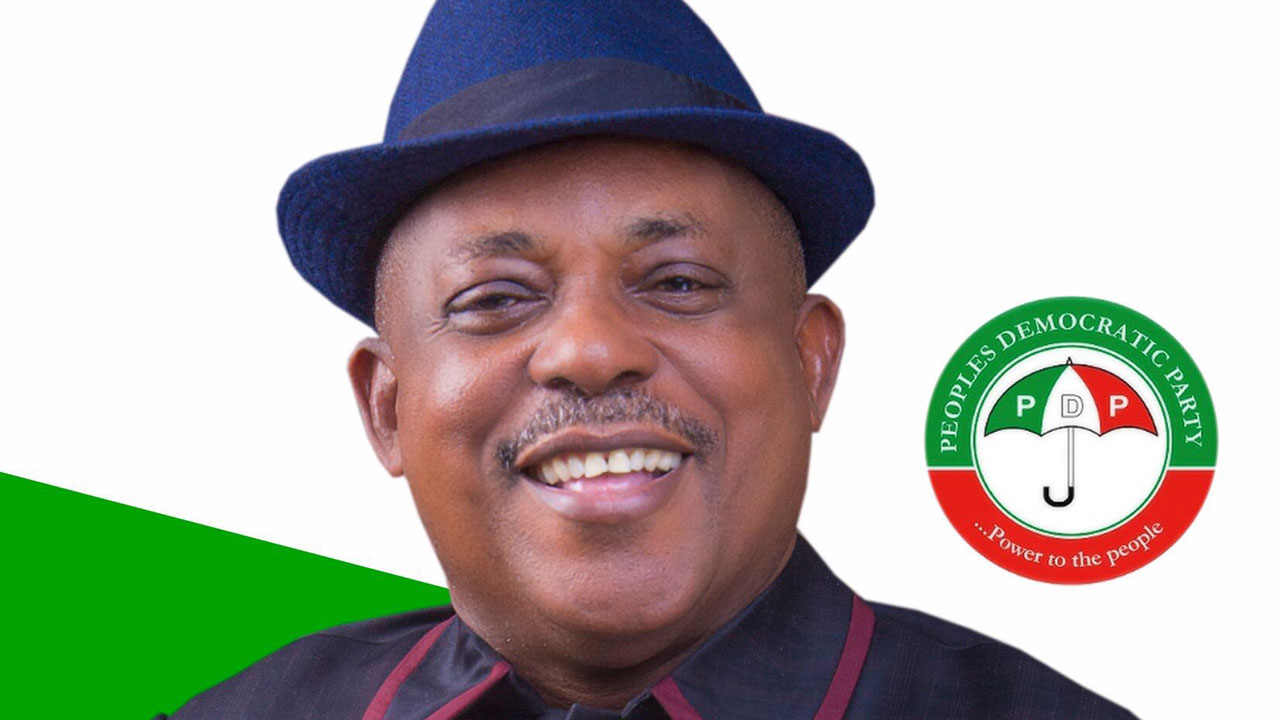
Imitate Gov Wike’s Exemplary Leadership To Save Nigeria, Bro Obuah Tells Nigerian Leaders
Press Statement
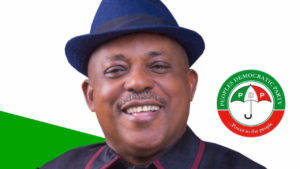
The Sole Administrator, Rivers State Waste Management Agency, RIWAMA, Bro Felix Obuah says if those who have mismanaged the nation’s resources in recent times for lack of ideas and leadership qualities had consulted the Rivers State governor, Nyesom Ezenwo Wike, Nigerians would have been a lot better, healthier and happier.
Bro Obuah who made the remarks while fielding questions from newsmen immediately after the presentation of Governor Wike’s scorecard in the last six years to Rivers people and stakeholders at the famous Obi Wali International Conference Centre, Port Harcourt, Monday, July 12, 2021, said the ingenuity and landmarks of His Excellency have confounded his political detractors and silenced the opposition in the State.
The RIWAMA boss said Governor Wike has not only written his name on the marbles for referencing but also proved beyond doubt that the mandate given to him by the Rivers people was not misplaced.
Sharing in the joy of Wike’s epochal breakthroughs in infrastructural and human capital developments, the RIWAMA boss who superintended the affairs of the ruling Peoples Democratic Party, PDP, and under whose stratagem the governor won the governorship election back to back in 2015 and 2019 respectively, said he would remain ever grateful to God for the choice of the courageous Governor Nyesom Ezenwo Wike.
He advised the All Progressives Congress-led federal government to swallow their pride and feel free to consult the Ikwerre-born politician for advice on how to pull the country out of the abysmal pit it has dragged her into.
Bro Obuah said it looks like magic that within so short a period, all the nooks and crannies of the State have been caught up in Wike’s revolution, changing the entire face of the state capital that even ‘we’ who live here are missing our way while driving because of not only the rehabilitated and newly constructed roads and flyovers, but also the installation of landmarks with hypnotizing aesthetic appeals.
The RIWAMA boss said, with the standard set by Governor Wike, it’s no longer going to be business as usual for any kind of person to long for the administration of any component the new Rivers State.
“I can’t but thank my leader, good brother, friend and state chief executive, His Excellency, Chief Barr Nyesom Ezenwo Wike, CON, GSSRS, PoS (Africa) for not disappointing the Rivers people and our dear party. He has practically touched all sectors of the state economy – education, health, environment, transport, sports, judiciary, name it. Let me once again, enjoin the good people of Rivers State to continue to pray for and give His Excellency their support and for sure, everybody will be happier for it. May the good Lord continue to grant him the good health and more grace to execute all he has for our state”, Bro Obuah prayed.
Jerry Needam
Special Adviser on Media and Publicity to
Bro. Felix Obuah, Sole Administrator,
Rivers State Waste Management Agency, RIWAMA.
Monday, July 12, 2021.
